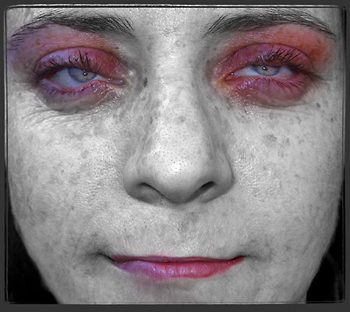 |
|
© Pedro Meyer 2001
|
"Tools vs.
Content"
by Pedro Meyer
|
|
"It
does not matter what the tools are, You will probably have come across such a statement, here or there, made by people fending off any effort to discuss the tools of their trade. They even suggest that a writer wouldn’t be discussing if a fountain pen or a typewriter was used to create a novel or a poem, so why, they ask, would a photographer waste time having the equivalent of such a discussion. At first glance, the argument looks very strongly in favor of that point of view. The only problem is that neither the fountain pen nor the typewriter can alter the possible outcome of either the poem or a novel while a digital camera can indeed modify the content of the photograph. There is no doubt that there are photographers who in absence of content in their images sustain an endless dialogue around their obsession with gadgets. Their relationship to photography is essentially as consumers not as creators. Nevertheless, we should not dismiss such an approach to photography; as these photographers contribute, through their consumption, in bringing to the market place, products that might not otherwise exist. This would be to the possible detriment of those who then use them solely for creative reasons. Think about it. I recall when I first started working with digital images, a good number of photographers would tell me that they did not need to waste their time learning anything about computers and software, as they could hire people to do that kind of work for them, if and when they needed to do “such stuff”. At other times it was photography teachers, or even heads of departments at universities, who would dismiss such discussions about technology. They considered such issues to be beneath their academic status. Finally, we had the art critics; they seem to be the ones to have held out the longest, it seems many critics live in a rarefied world of their own. In the end, the critics have been those who know the very least about any technical issue leading to the production of digital work, so a very easy way out to justify their limitations has been to be dismissive of the entire media. I believe it is a false dilemma; this dichotomy of “tools vs. content” because it remains anchored in a pre-digital reality. Unless you have been living in a cave, you will know that the influence of digital technology is an all encompassing one, and on a global scale. The technological changes we are living through, of course affects everything, not only photography. It touches the entire fiber of culture, as in entertainment, education, commerce, industry, science, health, communications and warfare, just to name a few off the top of my head. Faced with this transformation of modern civilization, the likes of which we have not known, at least not in our generations, it would be unwise not to become highly engaged in evaluating how all these new tools –in the case of photography- will affect our work. Not only are there changes in the way we produce, but also in how such content is affected by the emerging presence of the available technologies with which we can do things that were not possible before. When Marshall McLuhan stated in 1967: ‘The Medium is the Message’, little did he know about the potential of a Powerbook connected to a video camera or what can be produced on an iMac with iMovie. Today CNN announced that their reporters will be doing their work precisely with such tools. Understanding such transformations requires that we deal with both technological issues as well as the creative ideas. Adios to the dichotomy of tools vs. content. The pen/typewriter metaphor for the writer has little connection to the problems of the digital photographer. For the writer, either tool will not alter the content. However, the work of the photographer is going to be very much determined by the sort of digital instruments and the software employed, and how the resulting product might in the end be deployed. Let us explore a few examples of some of those changes that the digital photographer will have to contend with.
I have chosen to refer to only a few of the untold number of changes that are taking place for photography, today. The point is not to make an exhaustive inventory (for a closer approximation the book to read is: Photography: A Critical Introduction. Second Edition. Edited by Liz Wells) but to make a point about the lack of critical thinking of those that choose to ignore technical issues in lieu of content, when in fact the two topics are inseparable.
|